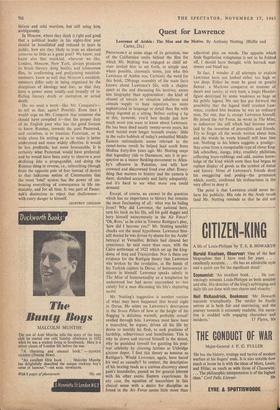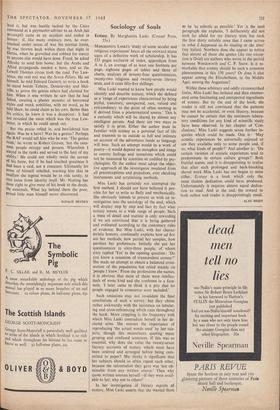MARGHANITA LASKI'S 'study of some secular and religious experiences' bears
all the outward status signs of a definitive work of scholarship. It has 533 pages exclusive of index, appendices from A to J, an average of at least one footnote per page, eighteen pages of tables and three of charts, analyses of seventy-four questionnaires, twenty-two religious and twenty-seven literary texts, and it costs fifty-five shillings.
Miss Laski wanted to know how people would identify and describe ecstasy, which she defined as a 'range of experiences characterised by being joyful, transitory, unexpected, rare, valued and extraordinary to the point of often seeming as if derived from a praeternatural source.' This is a curiosity which will be shared by almost any intelligent person. And there are two ways to satisfy it in print. Either the author must be familiar with ecstasy as a personal fact of life and transmit to us outside as full and intimate an account of the adventures inside as language will bear. Such an attempt would be a work of poetry—it would depend on metaphor and image to convey feelings and sensations which could not be measured by scientists or codified by psy- chologists. Or the author must adopt the objec- tive approach of the investigator insulated from all preconceptions and prejudices, ever checking instruments and scrutinising methods.
Miss Laski has certainly not attempted the first method. I should not have believed it pos- sible for her to write so flatly and mechanically. She obviously intends to present us with an in- vestigation into the sociology of the soul, which will display step by step and fact by fact what ecstasy means to a wide range of people. Stich a mass of detail and statistic is only rewarding if we are convinced that it is being gathered and evaluated according to the customary rules of evidence. But Miss Laski, with her charac- teristic honesty, continually explains how ad hoc are her methods, how partial her samples, how partisan her preferences. Initially she put her questionnaire to sixty-three people, of whom sixty replied 'Yes' to the opening question : 'Do you know a sensation of transcendent ecstasy?' She made no attempt to obtain a balanced cross- section of the population but relied mainly on 'people I knew.' From the professions she names, it is obvious that most of them were intellec- tuals of some kind and she confesses in a foot- note, 'I later came to think it a pity that no people engaged in commerce were included.'
Such omissions may not invalidate the final conclusions of such a survey, but they chime rather awkwardly with the insistence on tabulat- ing and cross-referencing which runs throughout the book. More crippling is the frequency with which Miss Laski contradicts herself in her de- clared aims. She stresses the importance of reproducing 'the actual words used' by her sub- jects, though this necessitates quoting many groping and confused sentences. If this was so essential, why does she value the twenty-seven literary accounts of ecstasy which must have been ordered and arranged before being com- mitted to paper? She thinks it significant that her subjects should so often repeat each other, because the information they gave was 'not ob- tainable from any written source.' Then why quote written sources herself—if they were avail- able to her, why not to others?
In her investigation of literary reports of ecstasy, Miss Laski asserts that she wanted them
Within these arbitrary and oddly circumscribed limits, Miss Laski has isolated and then enumer- ated some fascinating and unexpected ingredients of ecstasy. But by the end of the book, the reader is still not convinced that the patterns may not be accidental, or even illusory, because he cannot be certain that the minimum labora- tory conditions for any kind of scientific study have been observed. In her chapter of 'Con- clusions,' Miss Laski suggests seven further in- quiries which could be made. One is: 'May ecstatic experiences be universally enjoyed or are they available only to some people and, if so, what kinds of people?' And another is: 'Do certain varieties of ecstatic experiences tend to predominate in certain culture groups?' Both fruitful seams, and it is disappointing to realise that after such prolonged and back-breaking shovel work Miss Laski has not begun to mine either. Ecstasy is a book which only the most tireless dedication could have produced. Unfortunately it requires almost equal dedica- tion to read. And at the end, the reward to both author and reader is disappointingly small.
ALAN BRIEN
Shipmaster. By Gwyn Griffin. (Collins, 18s.) The Hard Life. By Flann O'Brien. (MacGibbon and Kee, 15s.) The Men of Friday. By Desmond Stewart. (Heinemann, 18s.) No Empty Hands. By Peter de Polnay. (W. H. Allen, I 5s.)
THE hero of Alberto Moravia's The Empty Canvas is a painter who suffers from boredom to the extent that he can no longer credit the validity of anything except himself. Having wisely given up painting, therefore, he turns to that old panacea, sex; only to find that Cecilia, the cute little Roman he has chosen, though she somehow combines the bust of a mature Venus with the torso of Lolita and has sexual climaxes like 'epileptic fits,' is as boring as every- thing else. But suddenly Cecilia becomes elusive, starts lying, is seen with another man on the Spanish Steps; and so—great shades of Albertine —the painter falls in love with her, realising as he does so that things and people can only interest him in so far as they withdraw themselves and decline to be possessed.
Since his life is by now chaotic, he decides that his only hope is to fall out of love again, to achieve which he must know all his mistress's secrets and encompass her whole life; only thus will he be able to see her once more as a common- place object, which as such can be despised and dismissed. It takes Signor Moravia some time (though by his standards this is not a repetitious book) to work round to this really quite familiar proposition; but there are some sexual 'spectacu- lars' to liven up the way, and once he has got the







































 Previous page
Previous page